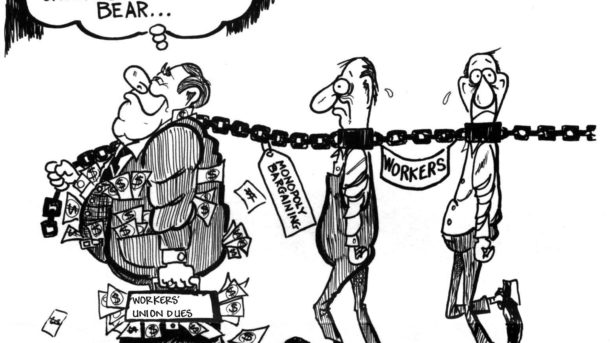Is This Any Way to Run a City’s Schools?
Leaked CTU Proposals Won’t Do Anything to Improve Schools’ Poor Performance

Barring Workers From Speaking For Themselves Profits Union Dons
Chris Brooks is a former organizer for the Tennessee Education Association (TEA/NEA) union. He is currently on the staff of the virulently pro-forced-unionism publication Labor Notes.
Not surprisingly, given his job history, Mr. Brooks is a lifelong opponent of Right to Work laws, which protect the individual employee from being fired for refusal to join or pay dues or fees to an unwanted union.
However, by comparison with the vast majority of top union bosses who share his opposition to Right to Work, Mr. Brooks is refreshingly frank about how monopolistic unionism actually operates.
Employer’s False Perception That Employees Are Monolithic Enhances Union Bosses’ Clout
The National Labor Relations Act and other federal and state workplace-governance laws that are patterned after the NLRA empower union bosses to represent workers who don’t want a union, as well as those who do.
This is why, according to Big Labor apologists, federal and state labor laws must also empower union bosses to force unwilling workers to pay union dues or fees. Otherwise, union officials and workers who agree with them will be unduly “burdened.”
However, as Mr. Brooks explains at length in an article published by New Labor Forum in September, the fact is that union officials benefit greatly from monopoly bargaining, which allows them to offer the sole “employee” perspective on workplace matters at the negotiating table.
The benefit to Big Labor is still great even when union nonmembers remain free, as they have been for 70 years in Right to Work Tennessee, where Mr. Brooks was formerly employed, to refuse to fork over any money to the union without being fired as a consequence.
Monopoly Bargaining Rollback ‘A Powerful Blow’ to Teacher Union Bosses in Tennessee
Tennessee had already been a Right to Work state for nearly six-and-a-half decades in 2011 when, thanks in part to the lobbying efforts of the National Right to Work Committee and its Volunteer State members, lawmakers in Nashville adopted the Professional Educators Collaborative Conferencing Act (PECCA).
From 1978 until the PECCA was signed into law by GOP Gov. Bill Haslam, Tennessee statutorily authorized union monopoly bargaining over public school teachers and other K-12 instructional employees.
Under certain conditions, the PECCA allows independent educator organizations that are opposed to monopolistic unionism, of which the largest and most notable is the Professional Educators of Tennessee (PET), to participate in contract discussions and offer an alternative employee perspective.
It is largely for this reason, in Mr. Brooks’ view, that “the passage of PECCA was a powerful blow” to TEA union chiefs and their political machine.
Mr. Brooks quotes Carol Hambright, the former president of the TEA union subsidiary in Polk County, regarding the impact of the loss of its monopoly privileges on her organization.
“We griped . . . for years,” she recalled, about negotiating contracts for people who didn’t want to join the union and refused to bankroll it. But now she would accept “in a heartbeat” that putative “burden” in order to exercise the privilege of “exclusive representation again.”
Benefits to Big Labor Bosses ‘Far Outweigh’ Costs ‘They May Incur’
Right to Work Vice President Mary King commented:
“Members and supporters of the Committee have long known that the enormous benefits union bosses derive from government-authorized monopoly bargaining far outweigh any costs they may incur in the course of exercising this special privilege.
“Nevertheless, the fact that a dyed-in-the wool proponent of compulsory unionism like Chris Brooks has now admitted in print that monopoly bargaining without forced dues is a modestly mitigated boon for Big Labor, rather than a ‘burden,’ is a helpful development.”
Ms. King encouraged Committee members to share the findings of Mr. Brooks’ article (entitled “Cure Worse Than the Disease”) with any politician who brazenly invokes the “burden” canard as an excuse for refusing to support Right to Work.

Leaked CTU Proposals Won’t Do Anything to Improve Schools’ Poor Performance

Wherever Big Labor wields the power to collect forced union dues, union bosses funnel a large share of the confiscated money into efforts to elect and reelect business-bashing politicians. Employment growth tends to lag as a consequence.

Members Insist They Keep Pro-Right to Work Campaign Promises